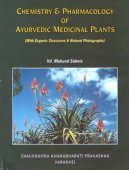Abrus precatorius: 2 definitions
Introduction:
Abrus precatorius means something in Hinduism, Sanskrit, biology. If you want to know the exact meaning, history, etymology or English translation of this term then check out the descriptions on this page. Add your comment or reference to a book if you want to contribute to this summary article.
In Hinduism
Ayurveda (science of life)
Agriculture (Krishi) and Vrikshayurveda (study of Plant life)
Source: Asian Agri-History: Drumavichitrikaranam—The Ancient Approach to Plant MutagenesisAbrus precatorius (Jequirity) was used to produce Seedless Fruits: which was one of the technologies known to ancient Indian agriculturists, which presents a safe technology and methodology regarding organic agriculture, according to treatises (such as the Vrikshayurveda). One such technology was to produce seedless fruits: Seeds often impart a bitter taste, thereby causing an unpleasant experience while eating the fruit. Seeds also accelerate fruit deterioration. Hence seedless varieties of fruits have greater economic value. Use of Abrus precatorius (jequirity), Madhuca indica (butter tree), Saussurea lappa (costus), Glycyrrhiza glabra (liquorice), honey, sugar, and clarified butter is said to cause seedlessness.

Āyurveda (आयुर्वेद, ayurveda) is a branch of Indian science dealing with medicine, herbalism, taxology, anatomy, surgery, alchemy and related topics. Traditional practice of Āyurveda in ancient India dates back to at least the first millenium BC. Literature is commonly written in Sanskrit using various poetic metres.
Biology (plants and animals)
Source: Google Books: CRC World Dictionary (Latin names; Binomial nomenclature)Abrus precatorius L. is the name of a plant defined in various botanical sources. This page contains potential references in modern medicine, Ayurveda, and other local traditions or folk medicine. It has the following synonyms: Abrus abrus (L.) W. Wight, nom. illeg., Abrus abrus W.F. Wright, Abrus cyaneus R. Vig., Abrus maculatus Noronha, nom. nud., Abrus minor Desv., Abrus pauciflorus Desv., Abrus precatorius var. novoguineensis Zipp. ex Miq., Abrus squamulosus E. Mey., Abrus tunguensis P. Lima, Abrus wittei Baker f., Glycine abrus L.) (Latin, relating to prayer.
References regarding Abrus precatorius L. for further research on medicinal uses or toxicity:
· Species Plantarum (1753)
· Familles des Plantes (1763)
· Systema Naturae, (1767)
· Verhandelingen van het bataviaasch genootschap van kunsten en wetenschappen (1790)
· Species Plantarum.
· Annales des Sciences Naturelles (Paris) (1826)
· Commentariorum de Plantis Africae Australioris (1836)
· Flora van Nederlandsch Indië (1855)
· Contributions from the United States National Herbarium (1905)
· Revue de zoologie et de botanique africaines (1932)
· Notulae Systematicae. Herbier du Museum de Paris (1951)
· For. Fl. Punj. (1956)
· Standard Shona Dictionary. (1959)
· Kew Bulletin (1970)
· J. Fla. Med. Assoc. (1978)
· Botanica Macaronesica (1980)
· Journal of Ethnopharmacology (1983)
· Willdenowia (1986)
· Economic Botany (1990)
· Journal of Ethnopharmacology (1995)
· Journal of Ethnopharmacology (1997)
· Journal of Ethnopharmacology (2000)
· Journal of Ethnopharmacology (2005)

This sections includes definitions from the five kingdoms of living things: Animals, Plants, Fungi, Protists and Monera. It will include both the official binomial nomenclature (scientific names usually in Latin) as well as regional spellings and variants.
See also (Relevant definitions)
Full-text (+688): Gunja, Kakacinca, Kakanantika, Cinci, Kakadani, Gunjika, Raktika, Kakajangha, Shvetagunja, Tulabija, Shangushtha, Kakatundika, Kakacinci, Patahika, Kakatikta, Ripughatin, Ratti, Chanoti, Guriginja, Yashtimadhu.
Relevant text
Search found 6 books and stories containing Abrus precatorius; (plurals include: Abrus precatoriuses). You can also click to the full overview containing English textual excerpts. Below are direct links for the most relevant articles:
Trishashti Shalaka Purusha Caritra (by Helen M. Johnson)
Part 6: Vimala’s initiation < [Chapter III - Vimalanāthacaritra]
Kautilya Arthashastra (by R. Shamasastry)
Chapter 19 - The Superintendent of Weights and Measures < [Book 2 - The duties of Government Superintendents]
Chapter 1 - Means to Injure an Enemy < [Book 14 - Secret Means]
Brihat Samhita (by N. Chidambaram Iyer)
The Skanda Purana (by G. V. Tagare)
Chapter 5 - Śrīnivāsa Enchanted on Seeing Padmāvatī < [Section 1 - Veṅkaṭācala-māhātmya]
Chapter 6 - Marks of Viṣṇu’s Devotee < [Section 1 - Veṅkaṭācala-māhātmya]
Satapatha-brahmana (by Julius Eggeling)
Kāṇḍa V, adhyāya 4, brāhmaṇa 3 < [Fifth Kāṇḍa]
Charaka Samhita and Sushruta Samhita (by Nayana Sharma)
Trade In Medicinal Drugs < [Chapter 7]
Related products



